Oregon is the latest state to agree: gas cars are passé.
On Monday, members of the Oregon Environmental Quality Commission approved a rule to ban the sale of new gas-powered passenger vehicles by 2035. This comes after California regulators voted to phase out gas-powered cars in the state back in August with their Advanced Clean Cars (ACC) II Rule. This was a very big deal not only because of California’s internationally infamous car culture, but also because its government is so influential for other states across the country.
Often, where California leads, other states follow — including when it comes to car emissions regulations. Shortly after California moved to do away with the combustion-engine vehicle, New York enacted the same regulations, along with Massachusetts and Washington — and now Oregon.
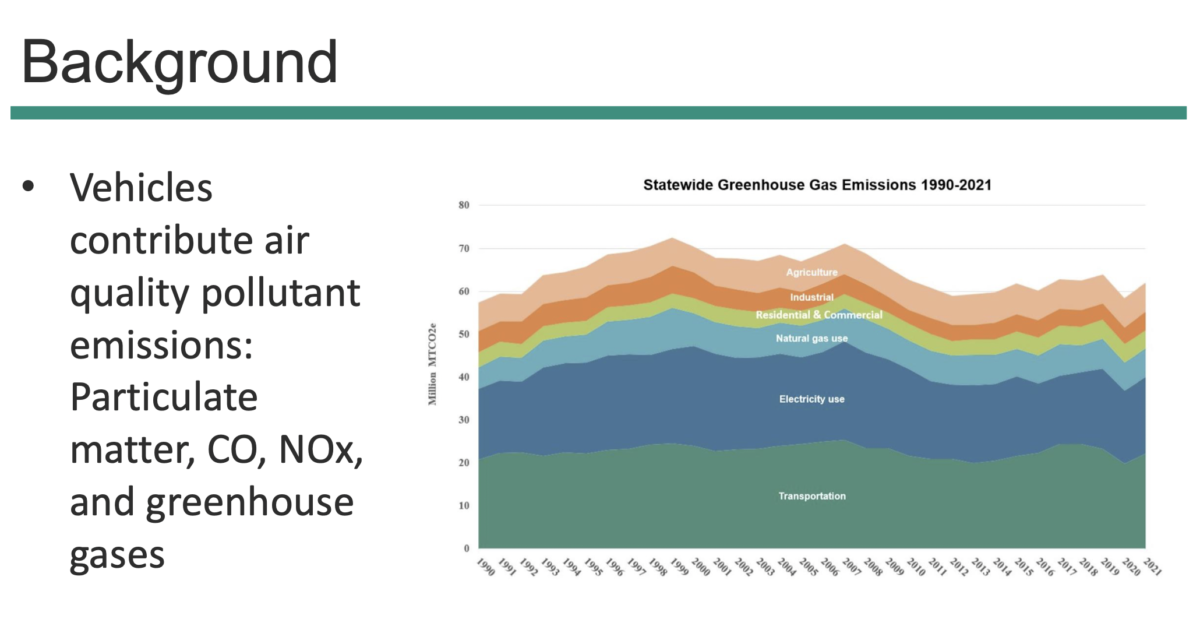
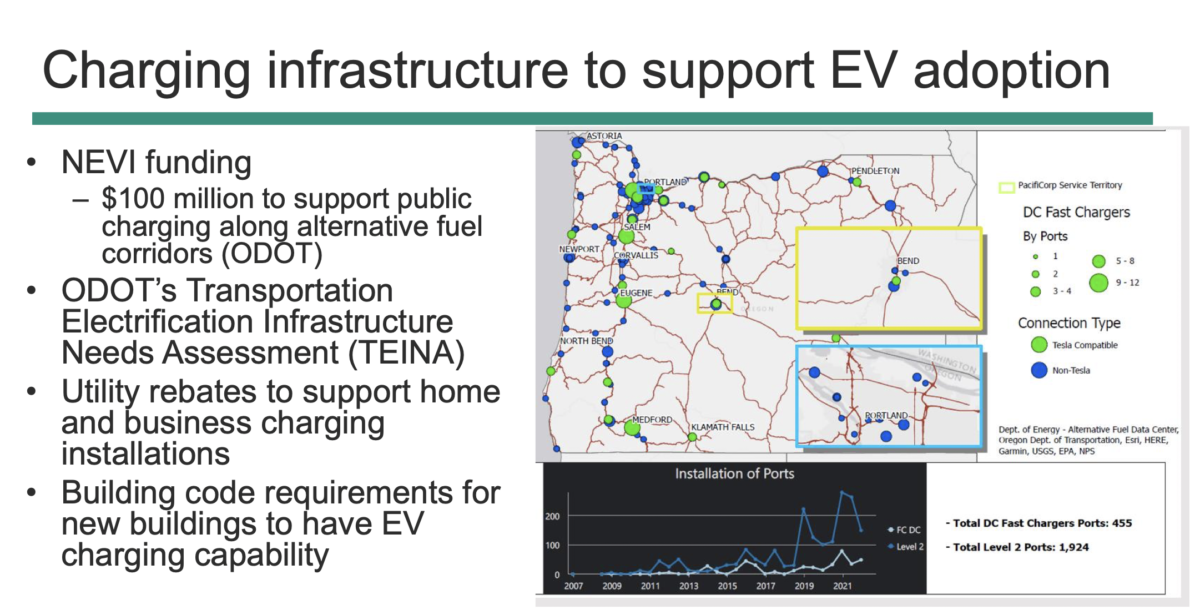
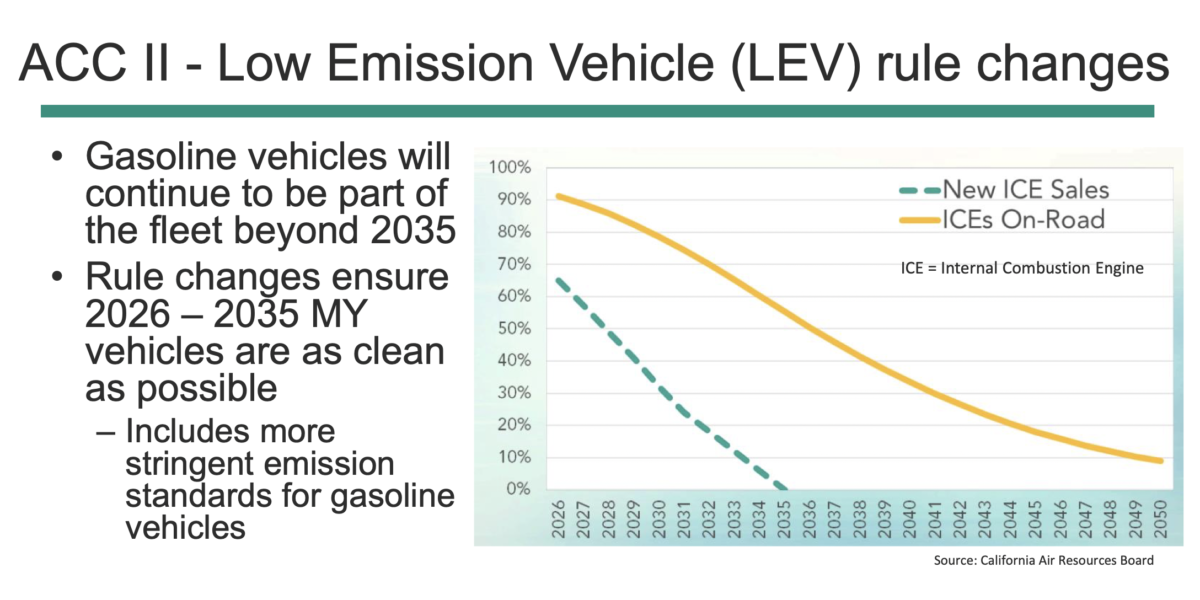
According to the rule, zero-emissions vehicles include electric cars, hydrogen fuel cell vehicles and plug-in hybrids (which have a longer-lasting battery than traditional hybrid cars). The rule grants that there will still be gas-powered vehicles on the road in 2035, however, since the ban is only on new car sales. People will still be able to drive and sell their old gas-powered cars on the used market. But as charging technology grows ubiquitous and electric cars become less expensive and are more readily available on the used market, electric car advocates hope their impact will be negligible.
Essentially, Oregon is simply adopting California’s ACC II Rule exactly. This rule “establishes a year-by-year roadmap” for zero-emissions vehicle (ZEV) sales leading up to 2035. It’s going to take a lot of work to get Oregon to get there. According to the Oregon Department of Transportation, about 8% of new cars and trucks sold in Oregon were electric as of last July. The ACC II roadmap says that number is going to need to more than quadruple in less than four years for us to meet 2035 goals.
People addressed these concerns and more to the Oregon Department of Environmental Quality, cautioning that there isn’t enough charging infrastructure in rural areas and for people who live in multiunit dwellings. People are also concerned about the higher upfront cost to purchase electric or zero emissions cars.
But there are certainly city, state and federal resources dedicated to solving these problems. ODOT is using a substantial amount of federal dollars from the Infrastructure Investments and Jobs Act to increase electric car charging stations across the state, including in more rural areas. And the City of Portland has initiatives to make our electric vehicle charging system more robust, one being a change in zoning regulations that will make it easier for people who live in multi-unit dwellings to charge their electric cars. And there are several e-car rebate programs in Oregon, some specifically targeted at people who live on low-incomes, to make the switch more affordable (not to mention all the money you’ll save on gas in the long-term).
While phasing out gas-powered engines will save our lungs and aid in the climate change battle, we’d be remiss to ignore the remaining drawbacks. E-cars are still cars whose oversized footprint takes up precious space from other road users (in addition to the environmental footprint of battery materials). They’re also heavier and quieter, and if you or a loved one is hit by a driver while walking or biking, it won’t give you much comfort to know their car runs on electricity instead of gas. And continued investment in cars means transportation agencies will justify spending billions on freeway expansion projects instead of allocating money toward things that are much more efficient, safe, affordable, and planet-friendly like electric bikes, better road designs, and so on. (But credit where it’s due: we might pass statewide e-bike rebate legislation next year!)
In the end, phasing out gas-powered cars will be nice for our lungs and bad for Big Oil; but it won’t solve all our problems and it could create new ones. Most environmental and transportation advocates agree there needs to be a balance between investment in electric cars and other modes of transportation. Hopefully government regulators will strike it.



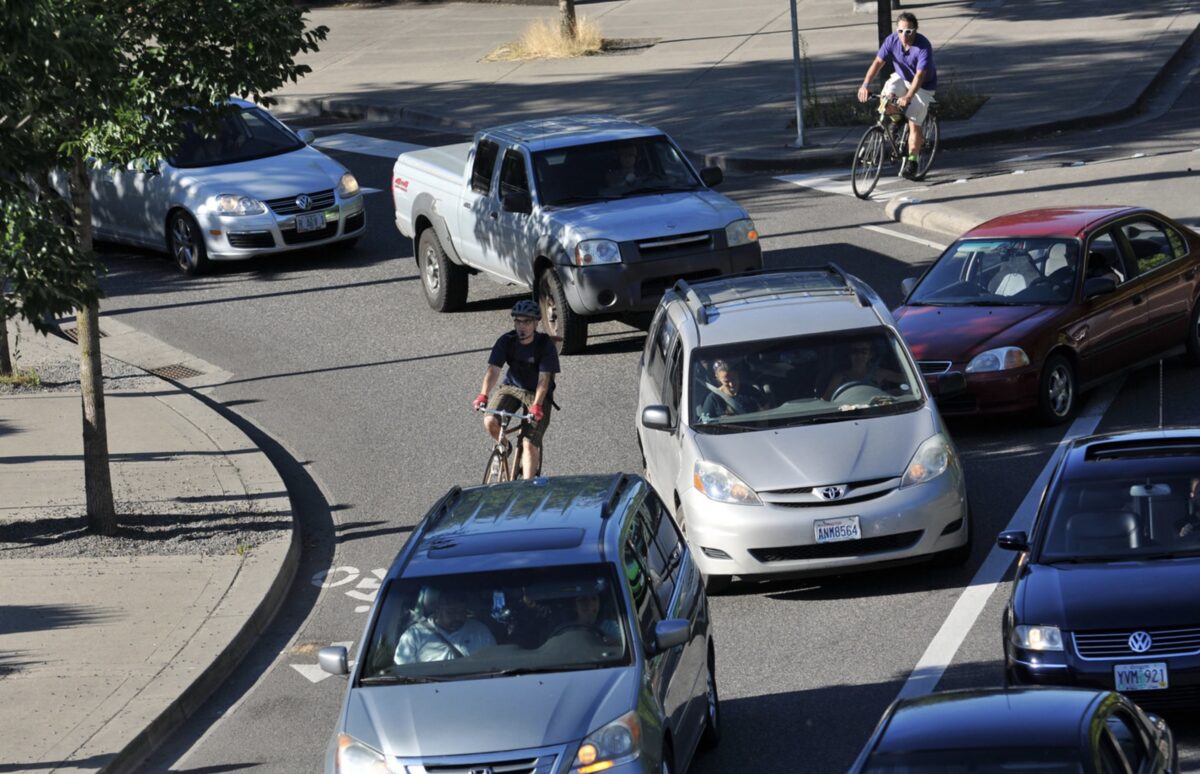
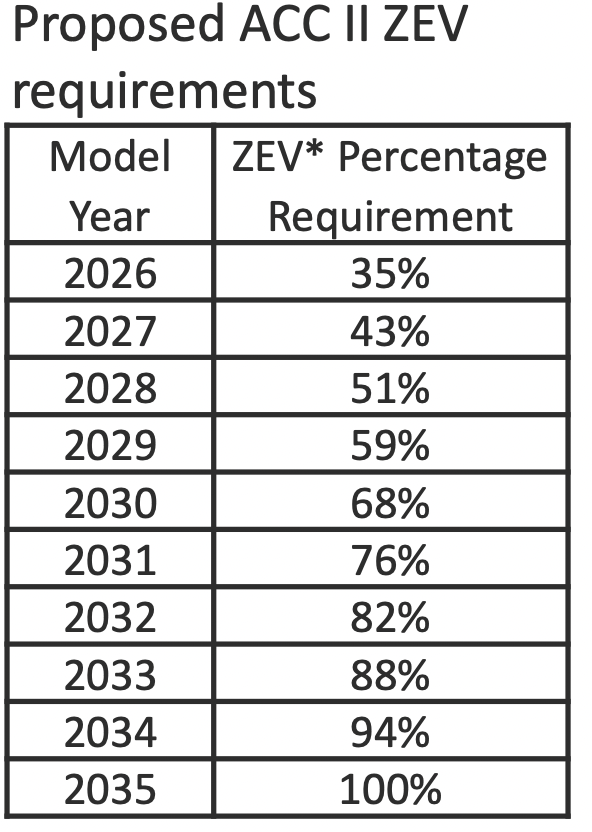
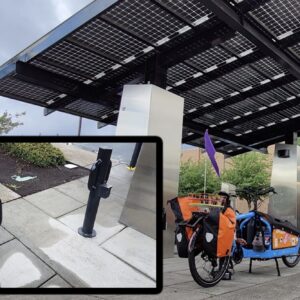
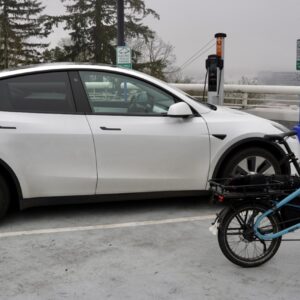

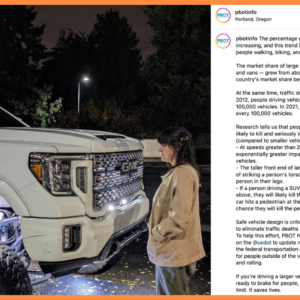
Thanks for reading.
BikePortland has served this community with independent community journalism since 2005. We rely on subscriptions from readers like you to survive. Your financial support is vital in keeping this valuable resource alive and well.
Please subscribe today to strengthen and expand our work.
These unfunded proclamations are a form of green washing.
Oregon is badly failing to meet its EV goals and it’s my guess that it will continue to fail to meet these goals in coming years.
https://www.portlandtribune.com/pt/9-news/522002-417101-oregon-not-meeting-electric-vehicle-goals-but-hope-remains/
Some of the barriers to wide-spread adoption of EVs are 1) a lack of smaller less-expensive EVs, 2) incredibly deficient and expensive public charging infrastructure, and 3) little to no infrastructure for renters or for people living in less economically-privileged areas.
Erasing these barriers would require a magnitude of government spending that will almost certainly be impossible given the dominance of regressive politics in Oregon and in the USA.
Inner Portland:

Outer East Portland:

Re: “magnitude of government spending…”
I’ll take this opportunity to point out that Japan, one of the countries with the highest bike mode shares and safest, most effective transportation systems, has a similar percentage of public sector spending as the USA: 46% in 2020. Total revenue was similar at 30% vs 34%
And 46% is a little lower than some advanced European countries (Netherlands 47%, UK 50%, Sweden 53%, Denmark 55%) but not that far off, it’s about what they spent back in the 80s or 90s.
Perhaps we have enough government spending, but it is not being used effectively.
https://en.wikipedia.org/wiki/List_of_countries_by_government_spending_as_percentage_of_GDP
Enough over the long-term? Sure.
Ideally, we would treat the climate-biodiversity crisis as morally worth ramping up deficit spending (as a percentage of the GDP) to WW2 levels.
(The military, medical-pharma, and financial-real-estate grift is incredible regressive and deeply embedded in our government spending and tax structures.)
I should note that I view personal EVs as a transitional decarbonization strategy. Ultimately we must transform our society* so that personal motorized “cages” are not the primary transportation mode but this will take many decades.
*I suspect that in the USA this will occur, in part, due to economic and political pressure from outside the USA.
Let me suggest that we don’t really have decades. Rather than encouraging electric cars we should be discouraging all modes of private transportation and get people to use public transit.
When you set goals for 2050 its because then you don’t have to consider immediate changes. You can delay things and pretend that intellectual exercises of public policy are progress.
If you really want to do something about global warming, put a tax on every parking space and ban parking in the central business center where transit can serve every trip. You make it inconvenient to drive your own car and you will do a lot more for ending global warming than by getting people to replace the energy for the hog with a different energy.
Even more of a question, why do we allow private jets? Let Bill Gates fly first class if he really needs to fly. In fact, does he or anyone else need to fly at all? Not really, not if it means helping make the planet unlivable for human beings.
Our approach to global warming is that no one really has to change their behavior. We can do all the same things, just differently. We will get a new form of plane to fly. We will replace cars and trucks with electric vehicles. We will replace gas furnaces with heat pumps. We will figure out a new kind of concrete.
The list goes on. No one suggests people live in smaller houses, travel less or buy less stuff. Or that we limit ourselves to local food produced with minimal energy inputs instead of having it shipped hundreds or even thousands of miles.
In short, what is needed is a revolution and the actual policies are weak tweaks of a failing, unsustainable lifestyle. We need to start pushing the boundary of what’s realistic. Because we are not actually making progress at anywhere neat the urgency the crisis requires.
“Our approach to global warming is that no one really has to change their behavior. ”
People aren’t going to change their behavior and scale back their standard of living on the scale and timeline you say is necessary. They just won’t.
You say people need to live in smaller houses, but we already have big houses. What will happen to those? Many people in Portland will not be willing to give up their avocados and bananas, and people living in Wisconsin will not give up all produce except cabbage, beets, and apples during their harsh winter.
Our only shot is a technological revolution, and, fortunately, one seems to be happening.
Malthus has been proven wrong over and over and over again. I think he’ll be wrong this time as well.
The carrying capacity of the earth is not infinite. A population that has a compounded growth rate (ours) will eventually overwhelm that carrying capacity.
This is unquestionably true. Fortunately, one of the great (and amazing) social changes of our time is our rapidly declining birth rate. It is falling off a cliff.
Those who argue that people should have fewer children get a lot of guff, but they’re fundamentally right. And, as a species, we’re doing just that.
It’s not “fortunate”. It’s one of the most condemning results of our current socioeconomic system.
Priding the absolute quality of life of people who already exist–making sure they never have to sacrifice any comfort or convenience, no matter how trivial and resource-intensive–at the cost of significantly reducing the number of people who could be brought into modest-but-meaningful existence is perhaps THE transcendent failure of our time.
I don’t care if I must live a moderately less-comfortable life if it means that Earth can sustain an additional two lives altogether. I’m very far from a pro-natalist, but even nihilistic as I often am, I have no right to impinge upon others’ chance to live if they would have a chance to be happy.
Malthus has nothing to do with it.
“Our only shot is a technological revolution, and, fortunately, one seems to be happening.”
No, it isn’t. Not if you look at actual results.
“People aren’t going to change their behavior and scale back their standard of living on the scale and timeline you say is necessary. They just won’t.”
Of course not when there are plenty of people telling them it isn’t really necessary. Either they deny global warming is really happening or they promise there is an easy fix.
More importantly you are promising that any sacrifice will be at someone expense. No one is asking coal miners whether its all right for us to end the industry that keeps them employed. But we need to ask BIll Gates if he is willing to give up his private jet. We can’t tell people they can’t fly if they can afford it. We need to ask motorists before we require them to lower emissions by reducing the size of their vehicle, their speed and their miles traveled.
People will give up avocados and bananas when there aren’t on the store shelves. Whether that is done to prevent global warming or just one of its very minor consequences.
I can’t promise an easy fix, but I am pretty sure that if we need to rely primarily on behavior change while there is still a chance of stopping the worst impacts of climate change, we really have no hope.
All I’m saying is that isn’t a realistic option. I’ve made more of the necessary changes in my own life than most people here, and I’m pretty sure even people on this forum wouldn’t follow suit. (But if you want to try, start with something easy: line dry your laundry and turn your heat down to 55. And, for the love of all that’s holy, don’t turn on your AC in the summer).
Bait finally taken. Air conditioning? We bought a heat pump a couple of months ago, does that count as AC?
Do you have any idea how cold my house is right now? Hint, I wear a warm hat inside.
Check on the.line drying. Never owned a dryer.
Now I’m going to raise you ten: I eat dandelions picked from the yard and enjoy it.
A pump most definitely is air conditioning. All air conditioning units are heat pumps.
I eat plenty of stuff from my yard, but not dandelions. You win on that point.
“I am pretty sure that if we need to rely primarily on behavior change while there is still a chance of stopping the worst impacts of climate change, we really have no hope.”
There you go. Its hopeless so why do anything? Because if we really can’t make people change their behavior then we really have no chance.
But of course we can make people change their behavior. We have done it repeatedly. People no longer drive drunk very often. They wear seatbelts. They don’t smoke in offices. People recycle. People don’t urinate in public. The list goes on.
And yes, some people will be defiant and resist. But all it requires is the collective will that it is important enough. Most people can then be made to accommodate their behavior to that collective will. The point isn’t really to change individual behavior but to change our society.
We really can ban private jets. But its not likely we will as long as people look to some futuristic “jet pack” technology that will magically stop global warming. The technology fix is not just a false promise. Its a distraction from the hard choices that really need to be made now. Sometimes I think the folks promoting it are doing more delay real progress than the climate deniers.
“Because if we really can’t make people change their behavior then we really have no chance.”
I’m a strong proponent of a carbon tax. Economic incentives are a great way to convince people to change their behavior. Relying on their better instincts and love of mankind is not.
I’ll completely support efforts to convince people to do the right thing for the sake of doing the right thing, even if I think it is a fool’s errand, and I’ll support any societal “hard choices” that our politicians want to make. I’ve talked to my elected officials about this issue on many occasions.
But I still see the technological trend line as very positive, and think that’s where the bulk of the solution will come from.
I find it incredible that so many people assume we could snap our fingers and provide frequent and efficient public transportation to the majority of Oregonians who do not live in urban centers. One of the reasons that EVs are absolutely essential to transportation decarbonization is that it would take decades to build the infrastructure to transition most USAnians from the bloody SUV/personal-truck.
FWIW, one of my primary criticism of Ubranists/Schoupistas is that they fight for market-based parking abundance instead of just banning parking in transportation rich areas (the main approach used in Europe).
Uh… every major European urban center I’ve visited, and I’ve visited a lot of them, has had tons of parking, in garages and often on street. And it’s heavily used.
Hi Watts, currently only 30% of Parisians own cars. I don’t know what the peak percentage was, but it has fallen enough that the city has a growing number of vacant parking garages.
Last weekend my husband saw an exhibit at the architecture center, https://www.pavillon-arsenal.com/en/expositions/12551-conserving-adapting-handing.html, on low-carbon designs for converting existing buildings into new uses. One section was about turning parking garages into housing. 70% of new building permits in Paris are for transforming existing buidings into new uses.
Things really are changing rapidly and intentionally in Europe. That’s what we notice, how quickly things are changing, and how seriously lowering the carbon footprint is taken.
It is true that Paris has a truly wonderful metro, fitting for the world capitol that they are, and, like New York City, car ownership is just not necessary for many people.
But outside of Paris, and perhaps a few other large cities, the French rely quite heavily on cars. Perhaps you remember the yellow vest protests, triggered by a “green tax” on fuel.
Yeah, but. We took the TGV from Paris to a small village near the Loire. The TGV station had a park and ride where you could rent a spot by the month.
And the little village had bike infrastructure.
The trend is that the rural population in France has been decreasing for decades, absolutely and as a percentage of total pop.
https://www.macrotrends.net/countries/FRA/france/rural-population
Globally, the movement of people from rural to urban areas is quite pronounced, it’s also been the trend for decades.
also, very few interstate highways or highway interchanges in the inner cities of Europe, Vancouver BC included.
😉
That’s so true, FDUP. But get a load of the image below. That is a mock-up of what freeway expansionists wanted to build in front of the Gare Montparnasse.
Parisians stood up to this and other plans, just like Portlanders are now.
When does that Parisian plan date to? I’m assuming it is not current. Portland has stood up to freeway expansions before, as did Vancouver BC. It is always a choice rather than an inevitability
In today’s *climate* it should be easier than ever to fight these highway expansion proposals, but maybe I’m engaging in wishful thinking?
All I can say is that I hope we figure it out and get it right sometime very soon, b/c the fate of the human race may depend on it. I’m not so worried about the planet, it will recover, and it might be better off w/o humans around to F things up.
Think about this – dinosaurs were at least as successful as humans, lasted 100X as long, and did not cause their own demise.
They also have lots of ring roads and park & rides both of which are blasphemy to USAnian urbanists (esp Schoupistas). And despite this blasphemy many suburban or exurban Europeans park their cars (cars still exist in Europe!) and take mass transit to the urban center.
The cars most europeans drive are not the same behemoth SUVs Americans drive, nor do they log equivalent mileage.
And I saw way more bicycles and motos at train stations and park and rides in Europe than cars. Except for a very small number of US cities, almost all European cities are served by better transit that is embraced and used by a much large percentage of the population.
I don’t even see what the point of your comment was except to be devisive?
I guarantee the carbon footprint of the ‘average’ or ‘median’ european is much smaller than that of a corresponding American or Canadian.
WTF is a Schoupista anyway?
Much of your comment is sealioning.
An example of a small P+R in Amsterdam:

And a larger multilevel P+R:
There are dozens of P+Rs on the periphery of Amsterdam and people can park in these lots for as little as 1 euro. Even in the Netherlands, non urban people tend to drive and they should be encouraged (forced) to use mass transit when visiting a city. Amsterdam has a policy of parking elimination in the urban center which essentially forces car-dependent people to use peripheral parking lots and mass transit. Weirdly enough many USAnian “urbanists’ are fiercely opposed to this.
“the majority of Oregonians who do not live in urban centers.”
That depends on what you call an urban center. If you look at the Portland Metro, Salem, Eugene-Springfield, Corvallis, Medord areas the majority live in one of those urban centers.
But where people live is part of the problem. Instead of choosing to live close to work, they live and drive across town. And yes, there are rural areas where mass transit is not going to work for local trips. But that isn’t where the bulk of the climate emissions from motor vehicles are getting generated.
I don’t underestimate the challenges of providing transit in suburban areas. But the major challenge is getting enough ridership. The second major challenge is the pedestrian environment. Those two are related.
One primary reason people don’t take transit to work in the suburban office parks is that they are stuck once they get there. Its a chicken and egg question that defies incentives.
You have to have a plan that addresses all at the same time, get people out of their cars, provide high quality transit as an alternative, create housing that is within walking distance and create attractive pedestrian environments on both ends.
Even if the USA coughed up the money to deeply subsidize frequent and efficient mass transit in more sparsely populated suburbs and exurbs, the real killer is, as you eluded to, that the built system does not accommodate large numbers of pedestrians walking to bus stops. With enough will and revenue both problems are solvable but the solution to the lack of pedestrian infrastructure requires either a massive amount of money to pedestrianize suburbs/exurbs* or some very concerted effort/mechanism to cajole people to move to denser urban centers/villages. These kinds of changes would take time — hence a transitional need for short- to medium-term electrification of ICE vehicles.
*this would be very dumb
I used to rail against this, and I still do for people who choose to live in, say, Camas, and work in Oregon City. However, for most people who live in the urban centers you describe, living on one income for more than one person isn’t feasible. So, if two cohabitating adults both need to work to support the household, whose job do you live close to? If you’re both working, and at least one of you is going to “have” to drive, it seems a lot more reasonable to live where you can afford the housing you want and accept both people driving as necessary.
If we could get back to a place where a household (1-2 adults, 1-2 kids) could live on a typical single income, that would fix so many of our transportation problems. You could then reasonably expect most people to be able to live within a sub-30 minute walk/bike/transit commute of that one job, which then makes one car or no car a practical option.
And cyclists in Portland are responsible for this exactly how?
Seems like you are barking up the wrong tree here!
“What would change if all these were e-cars? ” Sadly nothing except fewer airborne benzene particles. 😀 They’re still going to be big, and heavier- and while they say the vehicle must be a plug-in hybrid at minimum, there is no standard for that. If I have a car that can do 5 miles EV only attached to a V8, well, you get the idea. I imagine primarily gas powered motors will continue to be the dominant force for the next 50 years or so.
Oh and all electric vehicles are doubling acceleration numbers while adding 50% weight or so, making the inertia numbers off the scale. Sadly, if this continues, we’re going to have to adjust our “speed kills at this rate” number down a bit.
I’d be much happier if they spent their time actually funding an ebike credit for folks who just need a little push to take their car off the road and make more bike trips. It would cost next to nothing and yet we can’t get it done statewide or federally.
All other things being equal the major appeal of 4 wheeled over 2 wheeled vehicles are weather protection and carrying capacity, if you could solve those problems more ppl could be encouraged to bike rather than drive.
There is no need to build 4000-8000 lb 4 wheel motorized e-cages. ~1000 lb 3 or 4 wheel e-cages constructed of carbon materials are feasible.
Of course they need to put more cars on the road to justify their crazed decision to move forward with two freeway expansion projects – Rose Quarter and IBRP.
This is all performative BS on the part of the state. The state would do much better by reining ODOT’s proposed highway expansions and bridge construction projects in, tolling the highways and bridges, banning studded tires to limit future roadway damage, and working to expand their support for and protection of non-motorized users.
If we were serious about addressing climate change, we would ration the very limited supply of precious metals required for electric vehicles. If everyone that drove a car had a plug in hybrid with ~40 mile electric range (in addition to a gas engine for longer trips), we could drastically cut carbon emissions because almost everyone’s commute could be purely electric. This would be way more effective than what is happening now, which is allocating the precious metals to a small number of very expensive cars and trucks that get 300+ mile range and won’t even make a dent in carbon emissions.
The reality of our commercial society is that producing fewer goods and selling them at higher prices to wealthy people who have most of the money is more profitable than producing large amounts of goods for people with less money to spend.
If you use where the ultimate wealth created resides as a stand-in for the carbon footprint of producing that wealth then we are going to have to figure out how we get the wealthy to reduce their carbon footprint. Because ultimately they are the final user of most of our economic activity that creates emissions.
Right now we seem to be intent on protecting those who can afford it from having to make any changes to their lifestyle. That will require unlimited energy produced at no cost to the environment. That has been the promise made for new energy technologies for the past 75 years. I doubt it is any more true of solar and fusion than it was for nuclear power or cold fusion.
The absolute horror of new technologies like cheap and efficient solar, massive and efficient wind turbines, and utility-scale battery storage.
Car dealerships in Idaho are going to see a crazy surge in sales after 2035.
So how many Teslas are registered in Africa? 8000 maybe? Exactly! Anybody so concerned with the environment, please go to Ghana and watch a boat full of barely functioning cars from EU and hurricane flooded cars from US being unloaded 3x/week.More nonsense like this and we’ll end up with one EU/US (maybe Australia/NZ) standards and mandate to only drive electrics, and regular gas/diesel for the rest of the world, a market dominated by Chinese manufacturers. And Mercedeses for EU and non EU countries….(maybe). See gray imports in the ’80 and why BMW/Mercedes did not find it feasible to modify and import some models for the US market….